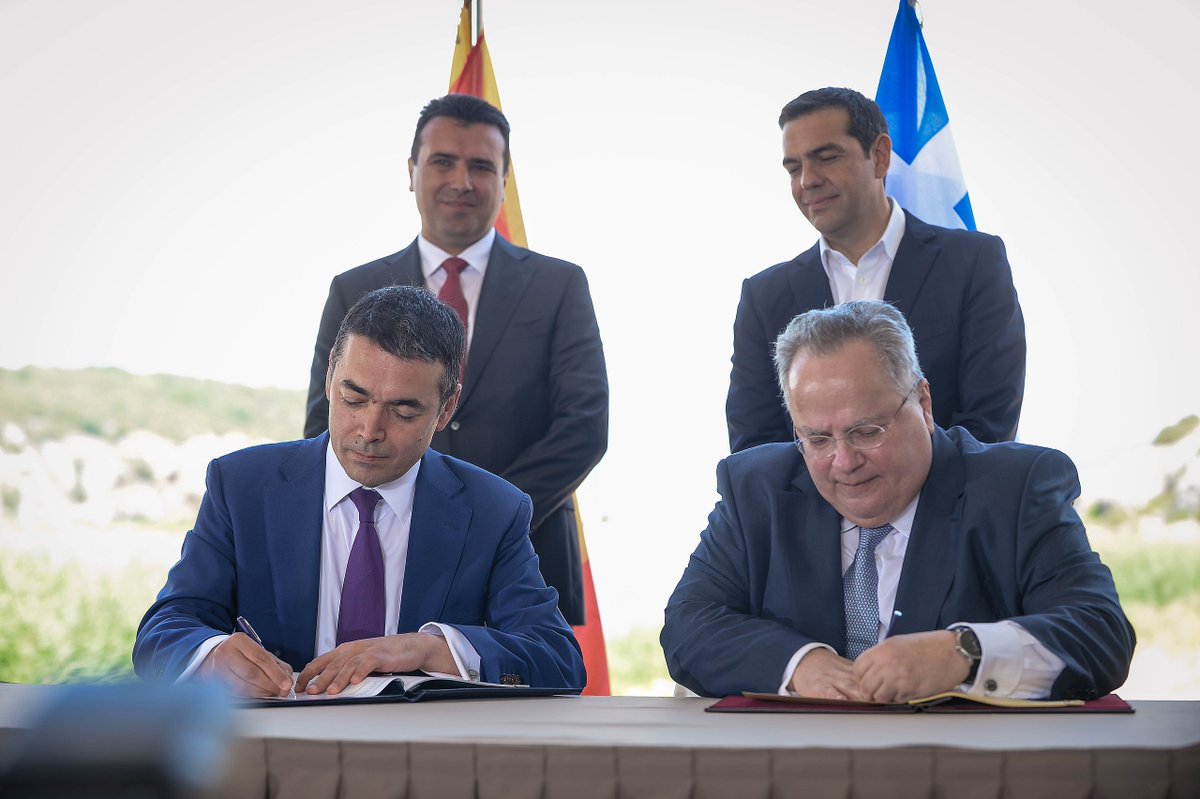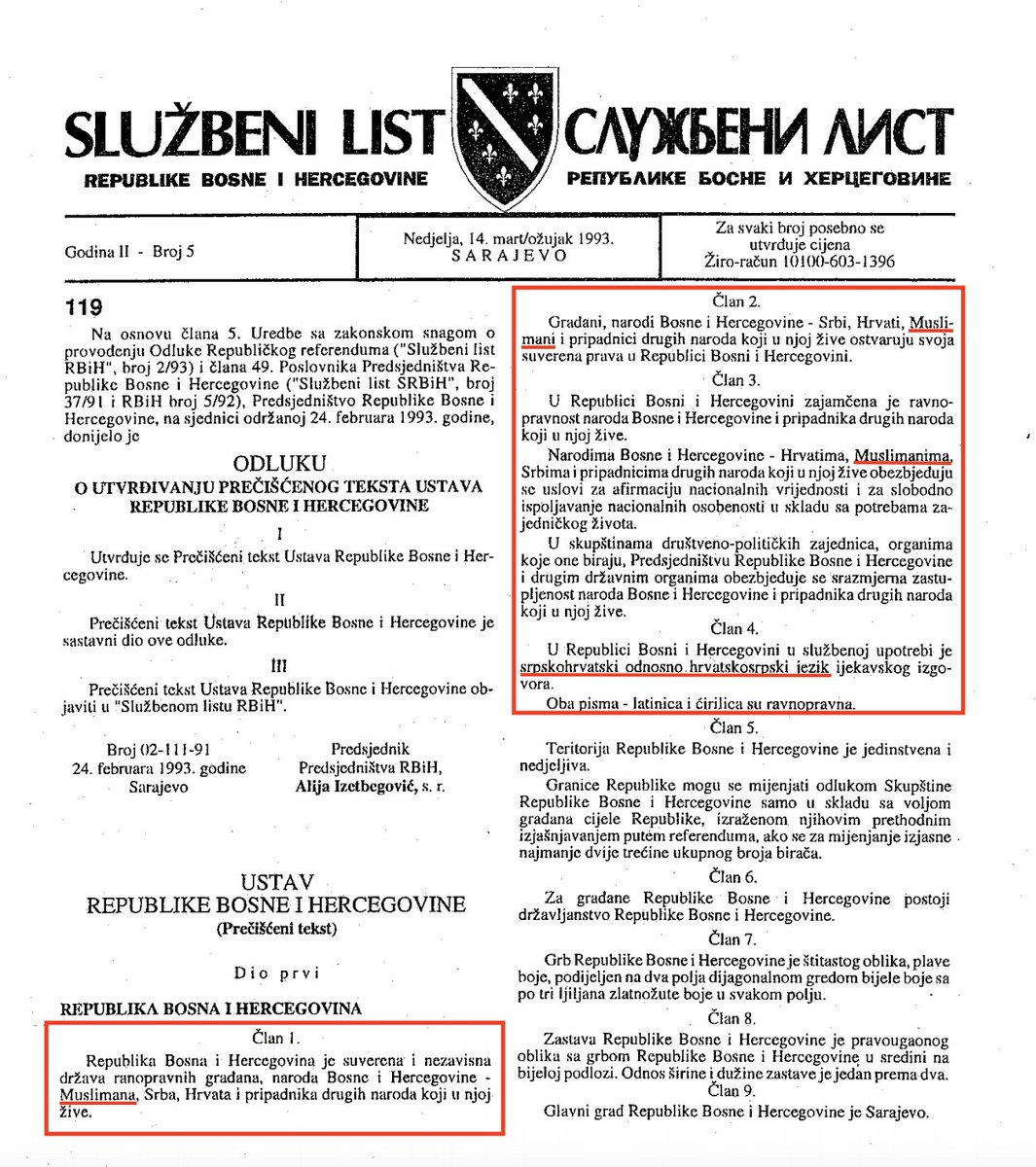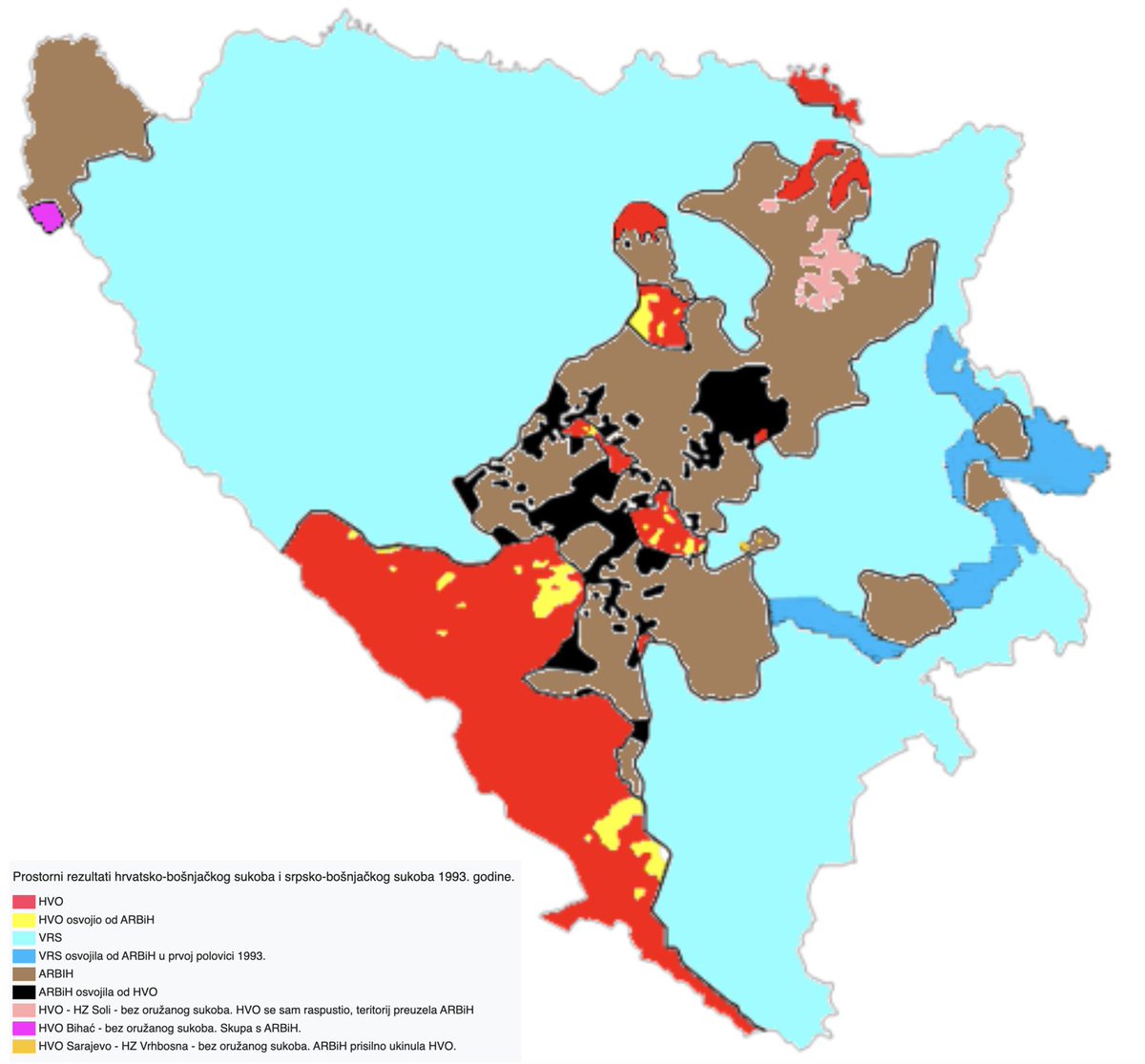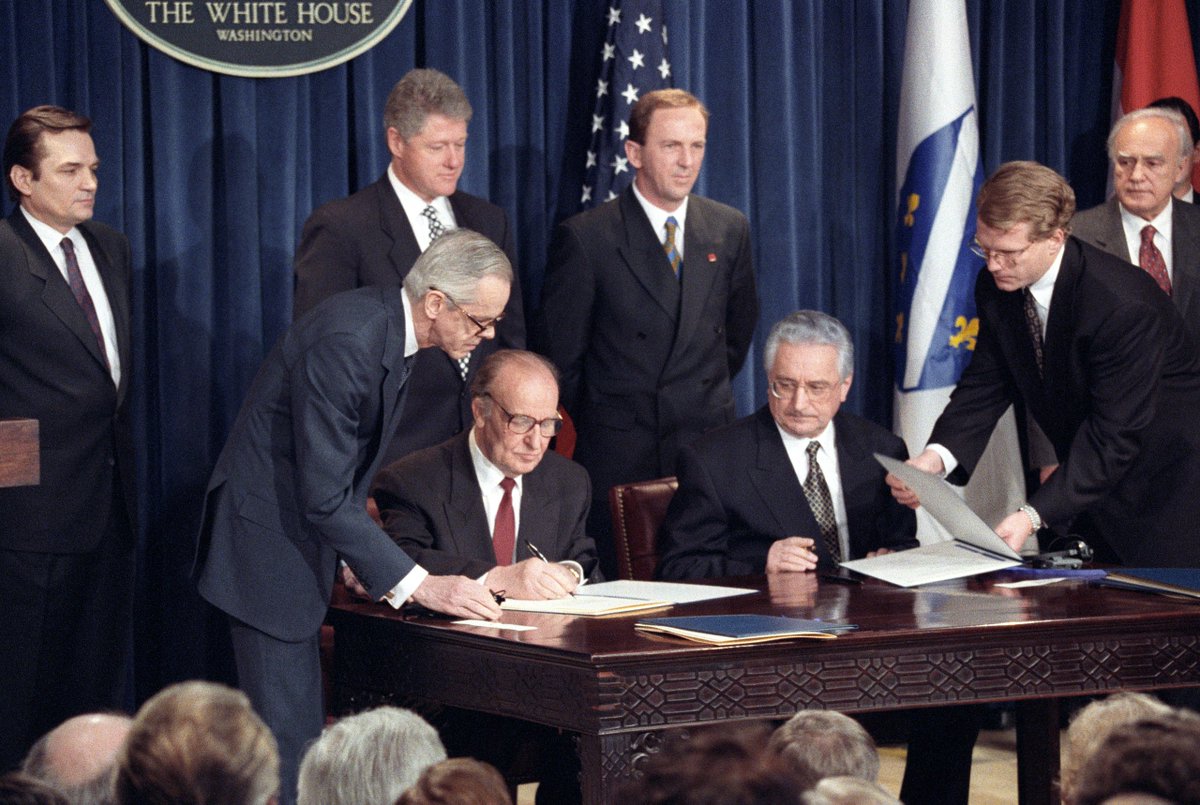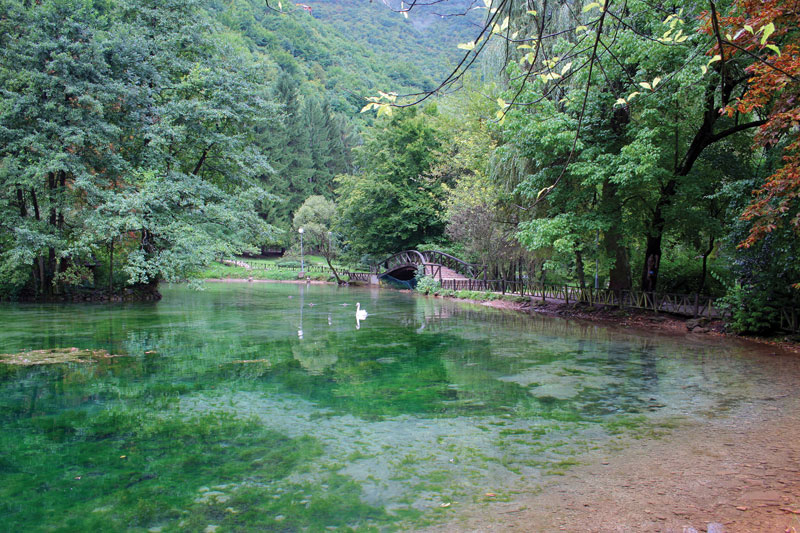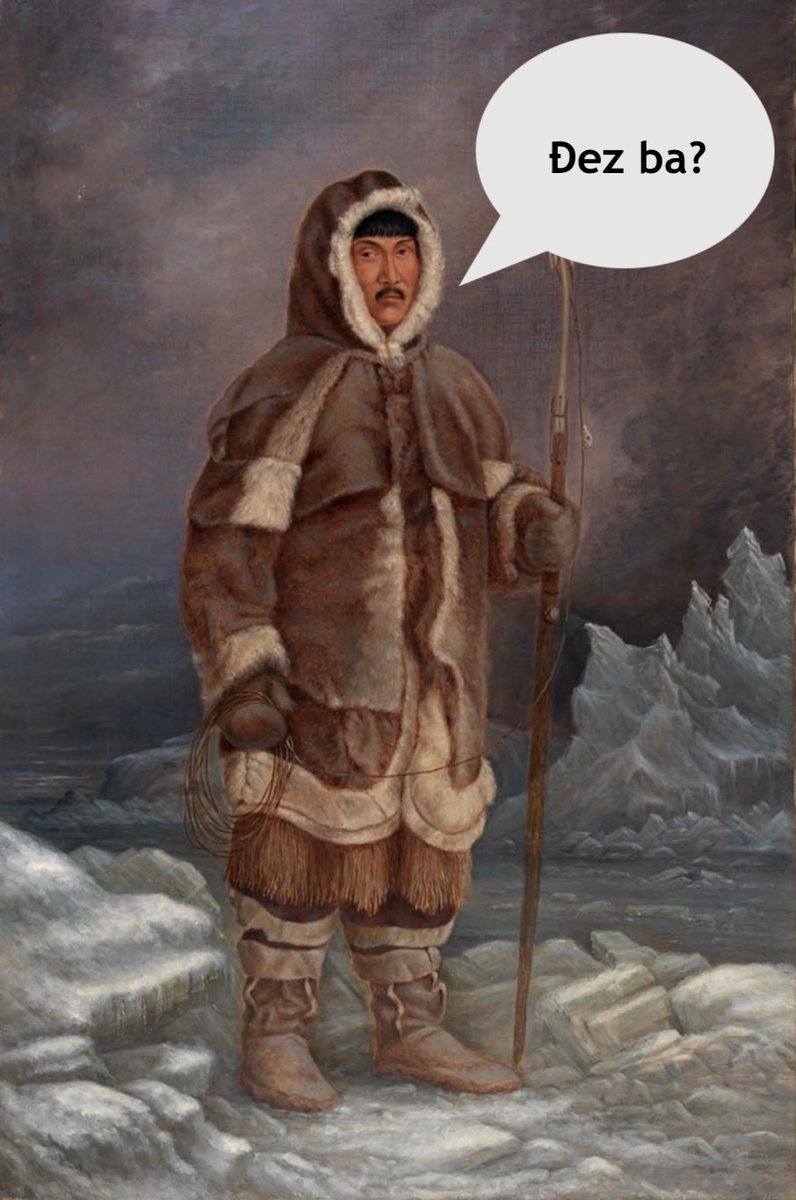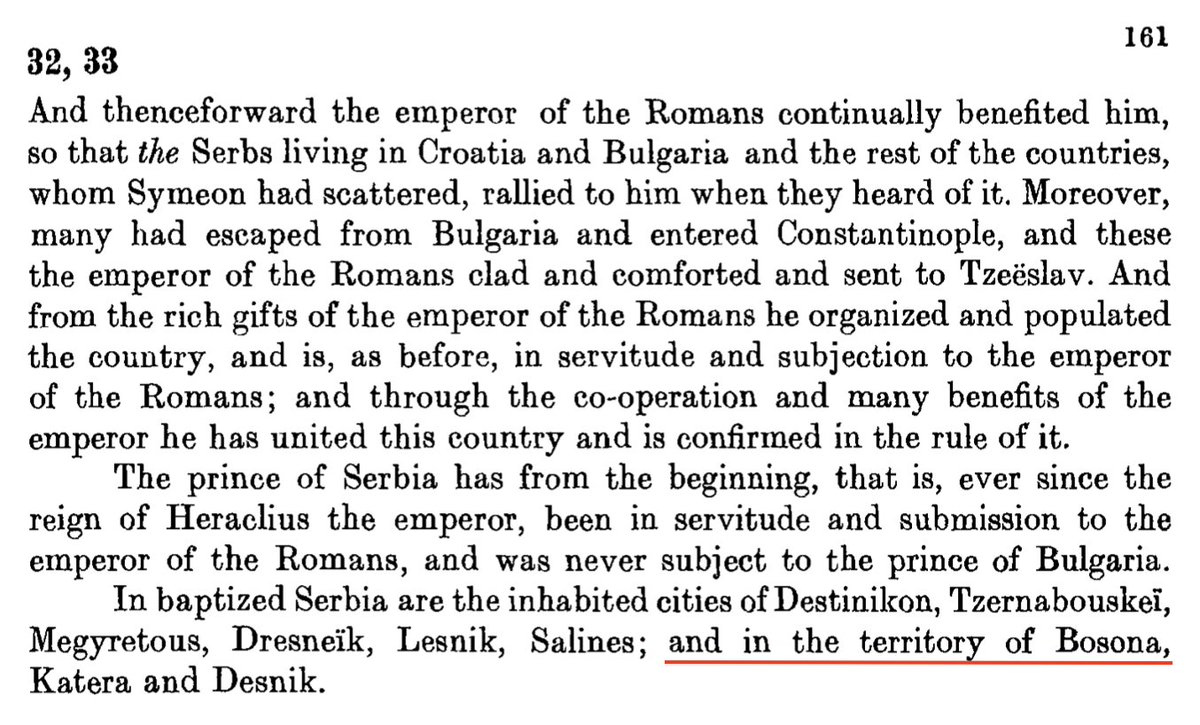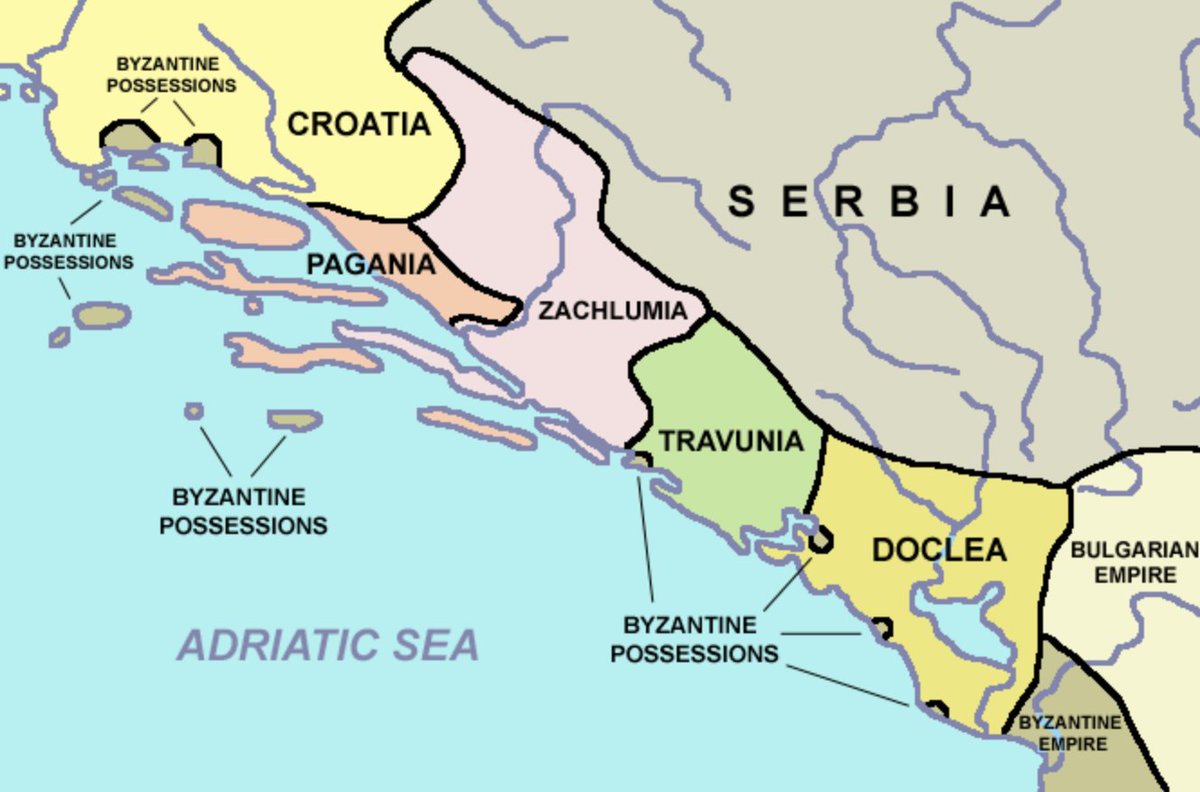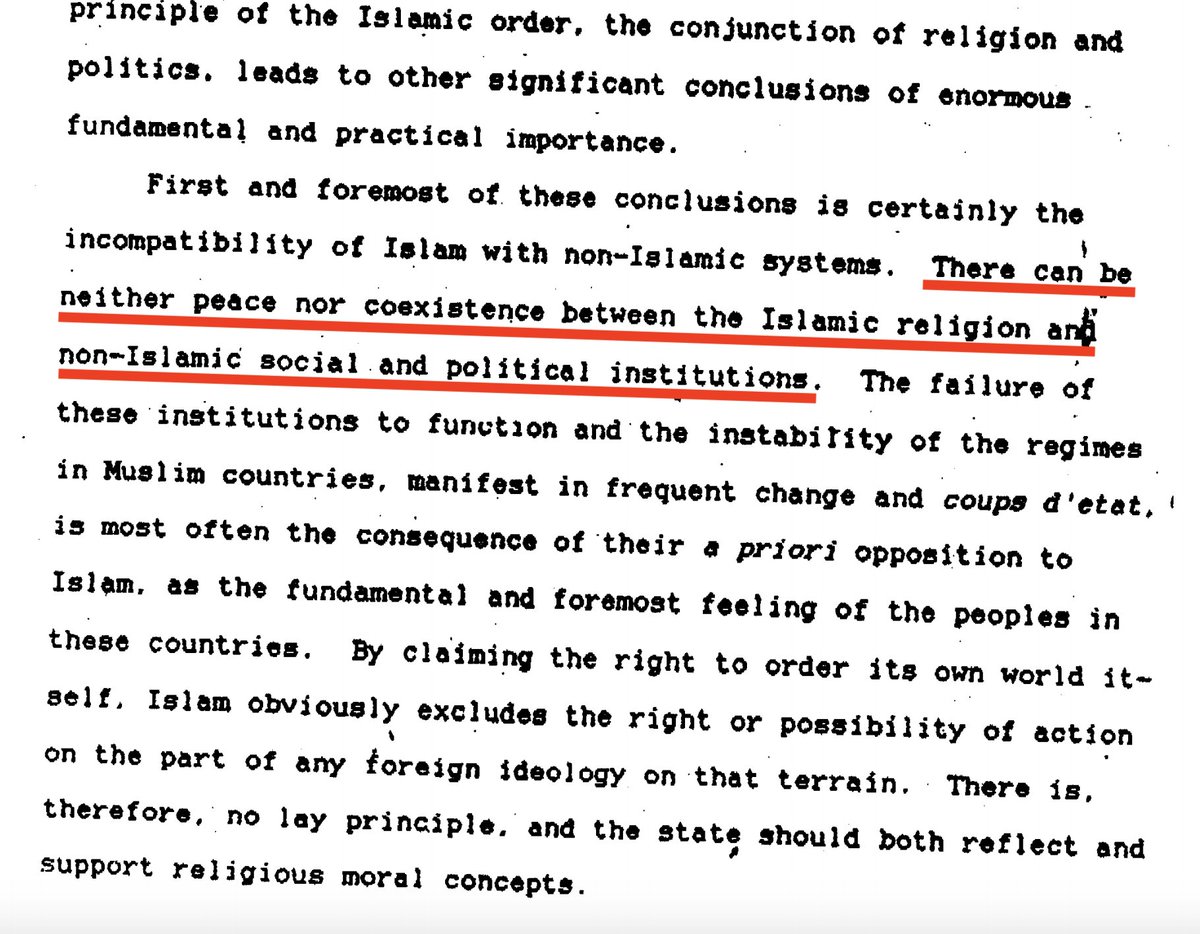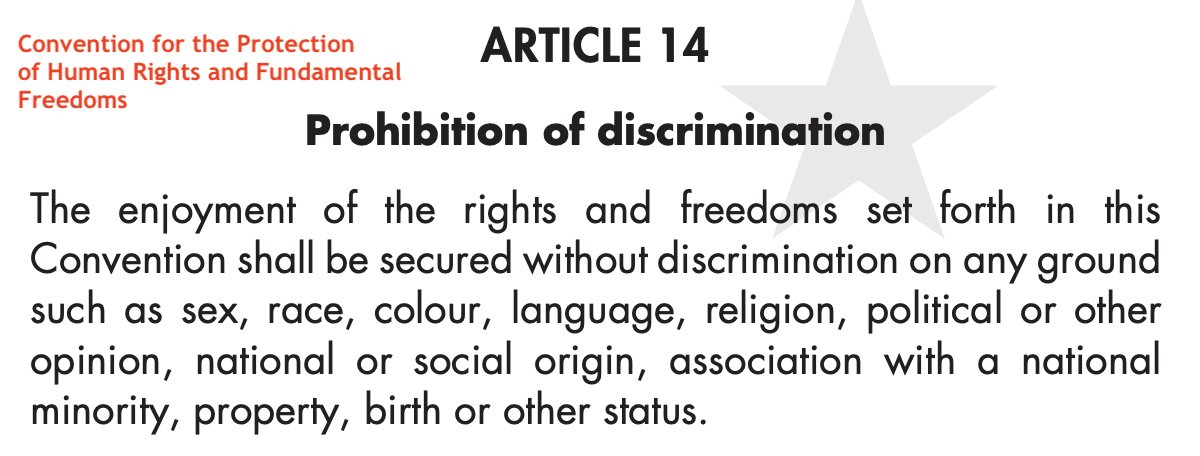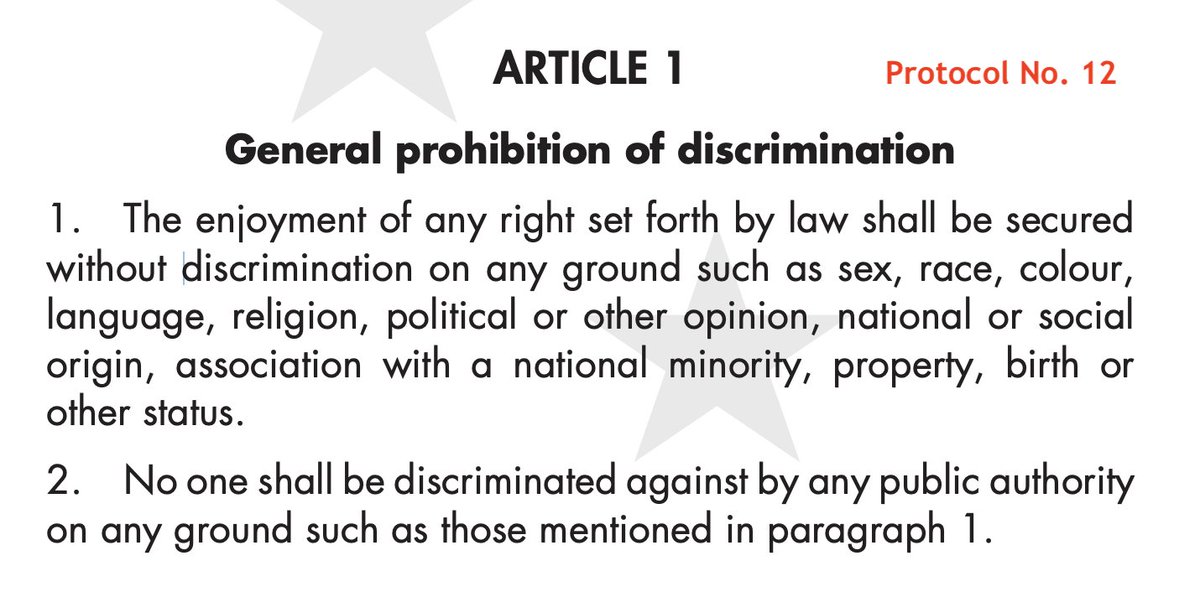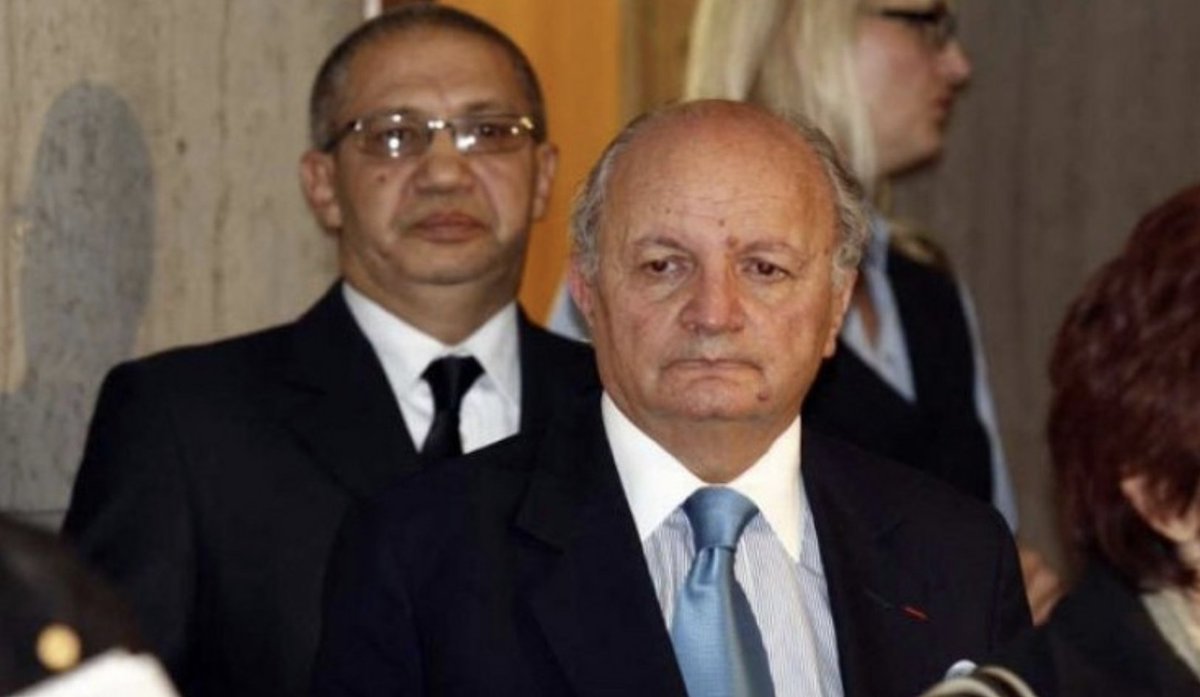THREAD: Time is up to stop toponymic nationalism and ethnocide in the BiH Project. It can be done by taking advantage of an opportunity that arose when Greece and Vardar opened Pandora& #39;s box, although relevant authorities and communities have slept on this one to date. (1/45)
In 2019, Greece and Vardar signed the undemocratic Prespa agreement, solving a long-standing dispute on a political level. In exchange for Greek approval on EU and NATO membership applications, Vardar accepted a name change and gave up conflicting historical claims. (2/45)
The name change (“North Macedonia”) was obviously a great compromise that came about because of stubbornness, like with most people whose national myths don’t correlate with reality. However, Vardar giving up historical claims is the true Pandora’s box in this agreement. (3/45)
What kind of stuff did these historical claims even include? Well, we’re talking about a Slavic people, whose identity never got ratified by anyone before irredentist communists did it, who were claiming a Hellenic rule as a part of their history. Can it get more absurd? (4/45)
So how did an agreement on stopping false historical claims, at the expense of other people& #39;s history, open Pandora& #39;s box? The answer is ongoing issues in the same region, particularly in the BiH Project, where a group of people makes similar claims to justify irredentism. (5/45)
The issue, noticed by many but rarely questioned on a serious level, is what this particular group of people has chosen to name their ethnic traits. To be precise, the chosen ethnonym is "Bosniaks" and the chosen language name is "Bosnian language". (6/45)
Before we start processing the etymology of the chosen names, let& #39;s take a look at the moment that started the ethnogenesis of so-called "Bosniaks" - the "First Bosniak Assembly", also known as "Prvi Bošnjački sabor" or "Svebošnjački sabor". (7/45)
The assembly was held between the 27th and 28th of September 1993 when the war still went on in the already then war-torn SRBiH. Anyhow, the so-called "Bosniaks" entered this conflict as Muslims by nationality (Muslimani) who spoke the Serbo-Croatian language. (8/45)
The assembly, arranged to artificially start an ethnogenesis, was also the moment when Muslimani leaders decided to switch gears. As the journalist Cyrill Stieger reported then for Frankfurter Allgemeine Zeitung, they "went to bed as Muslimani and woke up as Bosniaks". (9/45)
What was the reason to arrange this assembly in the middle of a war? It& #39;s pretty simple since 1993 was a very dark year for the Muslimani who had a conflict with every possible side, including their own people in Velika Kladuša. Foreign support was the only way out. (10/45)
The so-called "RBiH", which was (and is) the Muslimani side& #39;s unitary and fascist idea of a succeeding rule, was also barely established on ~1/4 of the claimed territory. Establishing the plan clearly didn& #39;t go as envisioned and strategical changes were necessary. (11/45)
The changes, which included the new ethnonym and the new language name, helped portray the Muslimani not only as the people with the most legitimate claims on the territory, but also as someone who is being aggressed on by foreign entities (Croats and Serbs). (12/45)
Also, from the uneducated international community& #39;s POV, it can be difficult to see how a people named "Bosniaks" aren& #39;t more "Bosnians" (inadequate but frequently used shortening for "Bosnian-Herzegovinian") than Croats or Serbs, who already have their own nation-states. (13/45)
This enabled the opportunity for Western media to portray the Croats and, mainly, the Serbs as some type of expansionist maniacs who wanted to gain control of something they have absolutely nothing to do with, just like Nazi Germany and Italy in WW2. (14/45)
The foreign pressure resulted in the treacherous Washington agreement in 1994, leading to a forcefully created Croat-Musliman coalition at the expense of Croats in the BiH Project. A force against the biggest threat towards Musliman agendas was now geared up to the max. (15/45)
The pact would later lead to even more pressure on the Serbs, who would be bombed in the Republika Srpska entity (Operation Deliberate Force) and put under heavy sanctions in FR Yugoslavia. This lead to one infamous agreement that would give birth to the BiH Project. (16/45)
The West, who ratified the undemocratic borders of AVNOJ on a state level, was satisfied. They contributed enough to move their influence eastwards. Muslimani& #39;s wishes weren& #39;t fully implemented, but at least they made the necessary decisions to avoid ending up as a joke. (17/45)
As we now have processed the acts that started the so-called "Bosniak" ethnogenesis and the aftermath, let& #39;s finally proceed to the etymology of the chosen ethnonym and the chosen language name, as well as the actions that should be made by the affected sides. (18/45)
The term "Bosniak" derives from the historic region of Bosnia, a fixed toponym that roughly comprises lands between the cities of Sarajevo and Zenica. The region itself was named after the river of Bosna as its spring, Vrelo Bosne, is located in the region. (19/45)
To advance even further into etymology, the river most likely got its name from the Proto-Indo-European term of "bhoĝ", meaning "running water". This term is also the root word for other relevant demonyms but with different suffixes, like "Bosnian" or "Bošnjanin". (20/45)
Since there are no defining differences between the suffixes, while the root word derives from the same fixed toponym rather than a nation-state (which i.e. creates a difference between "Serbs" and "Serbians"), the de facto definition of the words is the same. (21/45)
This means that all of the aforementioned examples are demonyms for someone from the region of Bosnia, without alluding to an ethnicity, spoken language or any other ethnic trait. Therefore it& #39;s logical to conclude that anyone can be a "Bosniak", from Croats to Eskimos. (22/45)
Can a demonym be used as an ethnonym for a legitimate ethnic group? The answer is no, not only because different ethnicities can be situated on the same toponym, but also because toponyms are unable to give birth to ethnicities and their traits, while humans can. (23/45)
This doesn& #39;t mean that there are no other cases where people identify internationally with a demonym while identifying nationally with ethnonyms, or only identifying with a demonym while recognizing their ethnic heritage. However, Muslimani still end up as a unique case. (24/45)
Even Bosnian historiography has been able to confirm the obvious definition of Bosnian demonyms, which is quite interesting since we& #39;re talking about a time period long before nationalism. Let& #39;s take a look at two examples based on charters from the Kingdom of Bosnia. (25/45)
The first example is how king Tvrtko I titled himself in his charters. At the territorial height of his rule, he titled himself as "king of Serbs, Bosnia, Littoral, Zachlumia, Dalmatia, Croats, Donji Kraji, Western lands, Usora, Soli, Podrinje, and others". (26/45)
The first example is not just proving that the region of Bosnia was separated from other regions in today& #39;s BiH Project, but also the ethnicities that inhabited them. Here& #39;s the second example, a charter from his predecessor proving who were considered "Bošnjani". (27/45)
As we now have eliminated the possibility of the demonym "Bosniak" being an ethnonym, or that it ever has been regarded as such in history, is there any possibility that the territory of the BiH Project always has been under toponymic rules, thereby creating an exception? (28/45)
The answer is no again. The first time someone mentioned Bosnia in historical documents was Constantine VII in De Administrando Imperio (10th century). At the end of chapter 32, named “Of the Serbs and of the country they now dwell in", Bosnia is described as a Serb land. (29/45)
Bosnia was (and is) not anywhere near the territorial size of today& #39;s BiH Project, meaning that other documented entities are also included in the project. Anyhow, not a single one of the other entities are mentioned to be dwelled by anyone else than Croats and Serbs. (30/45)
We also have the Chronicle of the Priest of Duklja from the 12th century, the oldest South Slavic chronicle, alluding further to a Croat presence in the area by describing lands like Zachlumia and Travunia as Croat lands while also solidifying Bosnia as a Serb land. (31/45)
Highlights of Croat and Serb presence include the length that Bosnia was under full Serb dependency, from the 7th century to 1082 under Serb dynasties (Vlastimirovici and Vojislavljevici), while the town of Bihać was Croatia& #39;s capital before the Ottoman conquest in 1592. (32/45)
As we& #39;ve basically reached a point where it& #39;s obvious that the chosen names aren& #39;t only inadequate because they& #39;re technically contradictive, but also because they are used at the expense of other people& #39;s history, let& #39;s end with actions that should be taken and why. (33/45)
Overall, the main reasons to take action against the conflicting name changes are mentioned in the very first tweet of this thread - toponymic nationalism and ethnocide. It is a serious threat in this region and would likely cause a conflict if it would escalate. (34/45)
Attempts to create forceful changes is not something hidden. The biggest Musliman party, SDA, is openly advocating for it. This was confirmed by the declaration they adopted at a party meeting in 2019, demanding a unitary and de facto Musliman-dominated so-called "RBiH". (35/45)
Fascist agendas in recent times is not a new phenomenon among them either. Their embraced war-time leader and arguably the greatest war criminal in the conflict, Alija Izetbegović (also known as "the Smederevac"), wrote this in his criminal work "Islamic Declaration". (36/45)
Allowing political "ethnicities" to work in this manner against authentic and autochthonic ethnic groups, who refuse being subordinated to them, is nothing else but a great crime against humanity and simply explains why a new Prespa agreement is urgent. (37/45)
An agreement is even more necessary than the one between Greece and Vardar was, based on the nature of the issue. Greece and Vardar& #39;s issue was stealth of history, while the issue in the BiH Project is stealth of history while manipulating it to justify fascist agendas. (38/45)
So what options are on the table? Among the negotiating options, one is to demand another name change and retreat from exclusive claims of others& #39; history. The other one is a Macedonian compromise i.e. keeping the names but recognizing that Bosnian history is not theirs. (39/45)
What would be the bait for Muslimani to even enter negotiations? That would be to spare them from choosing the third option, which is legal actions. Letting a fair trial process a verdict, based on the historic material that exists, would be deflating for the accused. (40/45)
What is the highest level of jurisdiction where issues like these could be considered? The answer is the European Court of Human Rights (ECHR), whose convention is ratified by the BiH Project. This is what two articles in the same convention is stating. (41/45)

 Read on Twitter
Read on Twitter